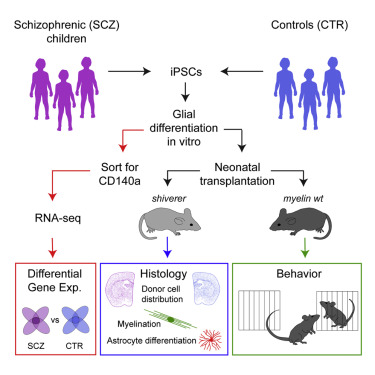当前位置:
X-MOL 学术
›
Cell Stem Cell
›
论文详情
Our official English website, www.x-mol.net, welcomes your
feedback! (Note: you will need to create a separate account there.)
Human iPSC Glial Mouse Chimeras Reveal Glial Contributions to Schizophrenia.
Cell Stem Cell ( IF 19.8 ) Pub Date : 2017-08-03 , DOI: 10.1016/j.stem.2017.06.012 Martha S Windrem 1 , Mikhail Osipovitch 2 , Zhengshan Liu 1 , Janna Bates 1 , Devin Chandler-Militello 1 , Lisa Zou 1 , Jared Munir 1 , Steven Schanz 1 , Katherine McCoy 1 , Robert H Miller 3 , Su Wang 1 , Maiken Nedergaard 4 , Robert L Findling 5 , Paul J Tesar 6 , Steven A Goldman 7
Cell Stem Cell ( IF 19.8 ) Pub Date : 2017-08-03 , DOI: 10.1016/j.stem.2017.06.012 Martha S Windrem 1 , Mikhail Osipovitch 2 , Zhengshan Liu 1 , Janna Bates 1 , Devin Chandler-Militello 1 , Lisa Zou 1 , Jared Munir 1 , Steven Schanz 1 , Katherine McCoy 1 , Robert H Miller 3 , Su Wang 1 , Maiken Nedergaard 4 , Robert L Findling 5 , Paul J Tesar 6 , Steven A Goldman 7
Affiliation

|
In this study, we investigated whether intrinsic glial dysfunction contributes to the pathogenesis of schizophrenia (SCZ). Our approach was to establish humanized glial chimeric mice using glial progenitor cells (GPCs) produced from induced pluripotent stem cells derived from patients with childhood-onset SCZ. After neonatal implantation into myelin-deficient shiverer mice, SCZ GPCs showed premature migration into the cortex, leading to reduced white matter expansion and hypomyelination relative to controls. The SCZ glial chimeras also showed delayed astrocytic differentiation and abnormal astrocytic morphologies. When established in myelin wild-type hosts, SCZ glial mice showed reduced prepulse inhibition and abnormal behavior, including excessive anxiety, antisocial traits, and disturbed sleep. RNA-seq of cultured SCZ human glial progenitor cells (hGPCs) revealed disrupted glial differentiation-associated and synaptic gene expression, indicating that glial pathology was cell autonomous. Our data therefore suggest a causal role for impaired glial maturation in the development of schizophrenia and provide a humanized model for its in vivo assessment.
中文翻译:

人类 iPSC 胶质细胞小鼠嵌合体揭示了神经胶质细胞对精神分裂症的影响。
在这项研究中,我们研究了内在的神经胶质功能障碍是否与精神分裂症(SCZ)的发病机制有关。我们的方法是使用源自儿童期发病 SCZ 患者的诱导多能干细胞产生的神经胶质祖细胞 (GPC) 建立人源化神经胶质嵌合小鼠。新生小鼠植入髓磷脂缺乏的颤抖小鼠后,SCZ GPC 表现出过早迁移到皮质中,导致与对照组相比白质扩张减少和髓鞘形成不足。 SCZ 神经胶质嵌合体还表现出延迟的星形胶质细胞分化和异常的星形胶质细胞形态。当在髓磷脂野生型宿主中建立时,SCZ 神经胶质小鼠表现出前脉冲抑制减少和异常行为,包括过度焦虑、反社会特征和睡眠不安。培养的 SCZ 人神经胶质祖细胞 (hGPC) 的 RNA 测序显示神经胶质分化相关基因和突触基因表达受到破坏,表明神经胶质病理学是细胞自主的。因此,我们的数据表明神经胶质成熟受损在精神分裂症的发展中具有因果作用,并为其体内评估提供了人源化模型。
更新日期:2017-07-21
中文翻译:

人类 iPSC 胶质细胞小鼠嵌合体揭示了神经胶质细胞对精神分裂症的影响。
在这项研究中,我们研究了内在的神经胶质功能障碍是否与精神分裂症(SCZ)的发病机制有关。我们的方法是使用源自儿童期发病 SCZ 患者的诱导多能干细胞产生的神经胶质祖细胞 (GPC) 建立人源化神经胶质嵌合小鼠。新生小鼠植入髓磷脂缺乏的颤抖小鼠后,SCZ GPC 表现出过早迁移到皮质中,导致与对照组相比白质扩张减少和髓鞘形成不足。 SCZ 神经胶质嵌合体还表现出延迟的星形胶质细胞分化和异常的星形胶质细胞形态。当在髓磷脂野生型宿主中建立时,SCZ 神经胶质小鼠表现出前脉冲抑制减少和异常行为,包括过度焦虑、反社会特征和睡眠不安。培养的 SCZ 人神经胶质祖细胞 (hGPC) 的 RNA 测序显示神经胶质分化相关基因和突触基因表达受到破坏,表明神经胶质病理学是细胞自主的。因此,我们的数据表明神经胶质成熟受损在精神分裂症的发展中具有因果作用,并为其体内评估提供了人源化模型。











































 京公网安备 11010802027423号
京公网安备 11010802027423号